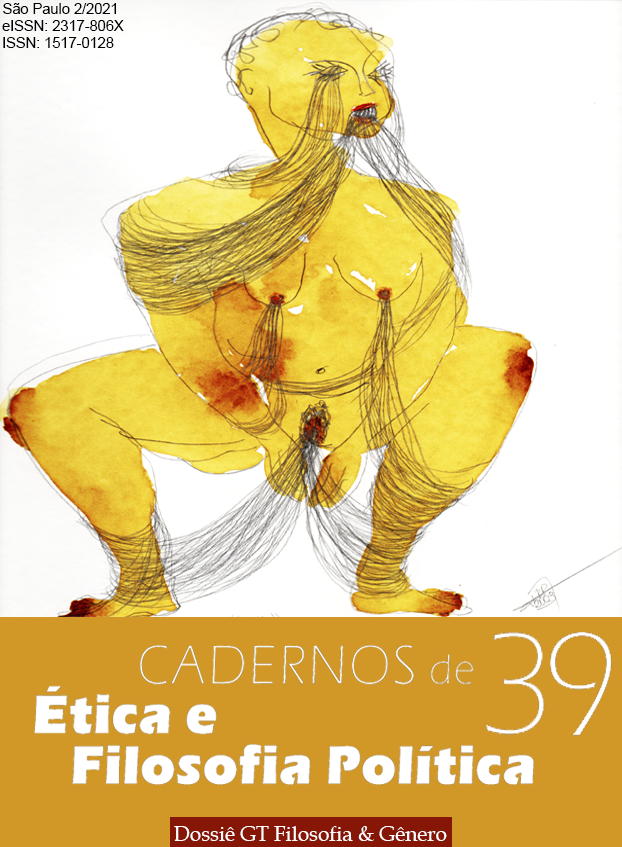In the theater room, “You must call me Diadorim”
DOI:
https://doi.org/10.11606/issn.1517-0128.v39i2p266-277Keywords:
Diadorim, Beauvoir, Butler, Performance, GenderAbstract
In a first moment, starting from the fact that Diadorim is a subjectivity crossed by the other’s look - that is, it is not a subjectivity that narrates itself, but a subjectivity whose “being” is put, in face of a first-person narrator, as “being-for-others” - it is necessary to inquire to what extent the revelation of his body as being a woman-body contributes, in the way in which Riobaldo-narrator weaves the threads of the past, to the accord between feminine and otherness. Therefore, it is a matter of investigating the adjustment established, in Rosa’s novel, between the feminine and its condition of “the absolute Other” as Simone de Beauvoir discusses. In a second moment, in addition to examining what the novel talks about (its adjustments and pacts), it is necessary to unravel what the novel conceals. In other words, more than capturing Diadorim in a gender identity, albeit provisional - Diadorim neither seems to perform the standards of masculinity imposed by his peers, for this reason receives the epithet “the delicate”, nor Diadorim “becomes a woman”, but she is, discursively, “made” a woman, in the advent of her death - we intend to demonstrate that what the novel conceals is the scandal, manifested already in the name “Diadorim”, of the disorganization of the norms of gender intelligibility. At this point, we will take Judith Butler's studies on the topic as theoretical assumptions.
Downloads
References
BEAUVOIR, S. O segundo sexo: fatos e mitos. 3ª ed. Trad. Sérgio Milliet. Rio de Janeiro: Nova Fronteira, 2016, vol. I.
BEAUVOIR, S. O segundo sexo: a experiência vivida. 3ª ed. Trad. Sérgio Milliet. Rio de Janeiro: Nova Fronteira, 2016, vol. II.
BUTLER, J. Problemas de gênero: feminismo e subversão da identidade. Trad. de Renato Aguiar. Rio de Janeiro: Civilização Brasileira, 2017.
BUTLER, J. Corpos em aliança e a política das ruas: notas para uma teoria performativa de assembleia. 2ªed.Trad. de Fernanda Siqueira Miguens; revisão técnica de Carla Rodrigues. Rio de Janeiro: Civilização Brasileira, 2018.
BUTLER, J. “Atos performativos e constituição de gênero: um ensaio sobre fenomenologia e teoria feminista” IN: Caderno de leituras. Trad. Jamille Pinheiro Dias, nº 78, 2018. Disponível em: https://chaodafeira.com/wp-content/uploads/2018/06/caderno_de_leituras_n.78-final.pdf. Acesso em: maio 2020.
BUTLER, J. “Performative Acts and Gender Constitution: An Essay in Phenomenology and Feminist Theory”. The Johns Hopkins University Press, p. 519-531. Disponível em: https://edisciplinas.usp.br/pluginfile.php/382761/mod_folder/content/0/Butler_performative_acts.pdf?forcedownload=1. Acesso em: maio 2020.
CANDIDO, A. “Jagunços mineiros de Claudio a Guimarães Rosa”. In: ______. Vários escritos. 3ªed. São Paulo: Duas Cidades, 1995, p. 147-179.
CANDIDO, A. “De Cortiço a cortiço”, In O Discurso e a Cidade. São Paulo: Editora Duas Cidades, 1993.
GALVÃO, W. As formas do falso: um estudo sobre a ambiguidade no Grande Sertão: Veredas. São Paulo: Ed. Perspectiva, 1972.
GALVÃO, W. A donzela-guerreira: um estudo de gênero. São Paulo: Editora Senac, 1998.
PASTA, JR. “O Romance de Rosa: temas do Grande Sertão e do Brasil”. In: Novos Estudos CEBRAP (Impresso), São Paulo, v. 55, n.55, 1999, p.61-70.
ROSA, J. G. Grande sertão: veredas. 19ªed. Rio de Janeiro: Nova Fronteira, 2001.
TIBURI, M. “Diadorim: biopolítica e gênero na metafísica do sertão”. In: Revista de Estudos Feministas, 21(1), janeiro-abril/2013, p. 191-207.
Downloads
Published
Issue
Section
License
Copyright (c) 2021 Luana Alves dos Santos

This work is licensed under a Creative Commons Attribution-ShareAlike 4.0 International License.


